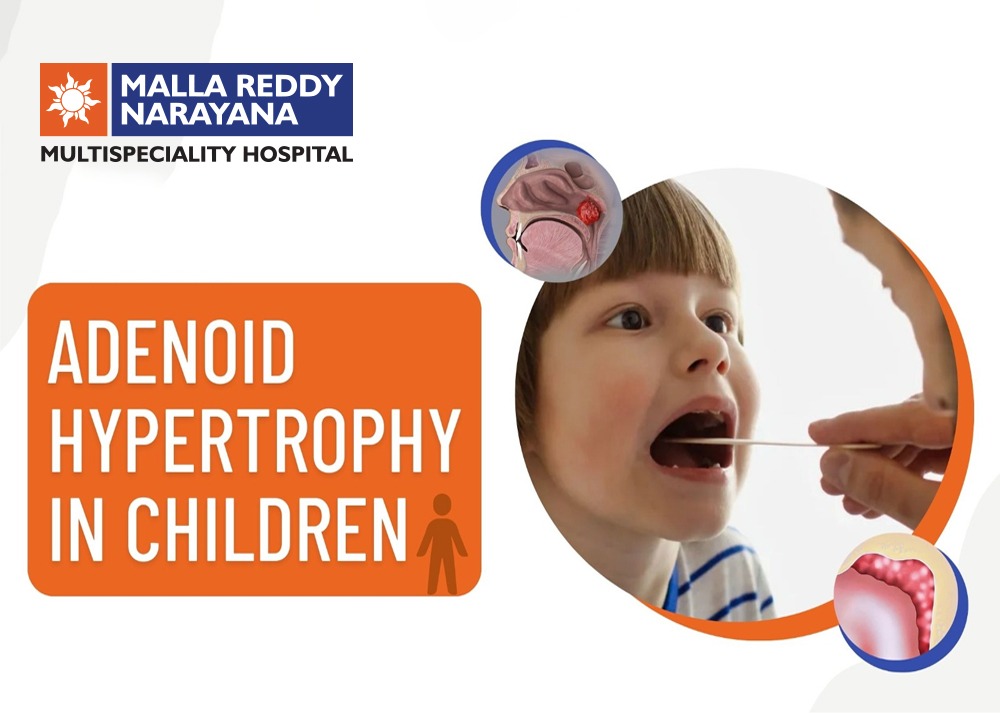Adenoid hypertrophy is a lesser-known but very common condition among children that can affect their ability to breathe, sleep, and even hear properly. The adenoids are a small mass of lymphatic tissue located behind the nose, above the roof of the mouth, where the nasal passages connect to the throat. While they play an important role in fighting infections in early childhood, they can become enlarged (hypertrophied) due to repeated infections or allergens, leading to a cascade of ENT-related problems. At Malla Reddy Narayana Multispeciality Hospital, Dr. P Venu Gopal Reddy, a senior ENT specialist, offers accurate diagnosis and compassionate care to children facing adenoid issues, ensuring they grow and breathe with ease.
What Are Adenoids and Why Do They Enlarge?
Adenoids are part of the body’s immune system and help fight off germs in younger children. However, because they are constantly exposed to viruses and bacteria, especially in daycare or school environments, they can become inflamed. When this inflammation is frequent, the adenoids remain enlarged and begin to interfere with normal airflow, nasal drainage, and even hearing mechanisms.
Adenoids typically shrink by adolescence, but in many children, they become excessively enlarged during early school years, especially between the ages of 3 to 10.
Common Causes of Adenoid Hypertrophy
- Frequent upper respiratory infections (cold, flu)
- Allergies – to dust, pollen, pet dander, or food
- Exposure to pollution or cigarette smoke
- Untreated or recurrent sinus infections
- Poor hygiene or contaminated water
- Genetic tendency or anatomical structure
- Monsoon and winter weather – encourage viral and bacterial growth in air and water
Symptoms and Warning Signs
Since adenoids are located behind the nose and cannot be seen without medical tools, the symptoms they cause are more apparent:
- Mouth breathing (especially at night)
- Snoring or noisy breathing during sleep
- Sleep disturbances – frequent waking, restless sleep
- Daytime fatigue or poor school performance
- Nasal voice (speech sounds blocked or stuffy)
- Recurrent ear infections or ear fullness
- Difficulty hearing due to fluid buildup in the middle ear
- Persistent cold or nasal congestion
- Frequent sore throat or tonsillitis
When these symptoms are left untreated, children may develop a condition known as adenoid facies, characterized by a long face, open mouth posture, and even dental misalignment due to chronic mouth breathing.
How Is It Diagnosed?
At Malla Reddy Narayana Multispeciality Hospital, Dr. Venu Gopal Reddy performs a careful evaluation through:
- Detailed medical history and symptom analysis
- Nasal endoscopy - A painless, minimally invasive procedure to visually assess adenoid size
- X-ray or imaging - In select cases, to understand the structural impact
- Hearing test or tympanometry – if ear involvement is suspected
- Sleep studies - For children with significant sleep-disordered breathing
Stages and Severity
Adenoid enlargement is often classified based on the percentage of nasal airway blockage:
- Grade 1 & 2 – Mild to moderate obstruction; often managed conservatively
- Grade 3 & 4 – Severe enlargement; often requires surgical intervention if symptoms persist
Treatment Options
1. Medical Management (First line)
- Nasal steroid sprays – Reduce inflammation and swelling
- Antihistamines – For allergic components
- Saline nasal irrigation – Improves mucus flow and drainage
- Decongestants (under supervision) – Relieves blockage
- Allergy control – Environmental modifications
This approach is usually effective for mild to moderate enlargement and focuses on symptom control and infection prevention.
2. Surgical Management (Adenoidectomy)
Adenoidectomy is the surgical removal of the adenoids and is recommended when:
- The child has persistent nasal obstruction and mouth breathing
- Sleep apnea or disturbed sleep is affecting growth and development
- There are recurrent ear infections or hearing loss
- Medical treatment fails to control symptoms
- Sinusitis and tonsillitis co-exist and become recurrent
This procedure is commonly done under general anesthesia and is safe, effective, and offers long-term relief. In many cases, adenoidectomy is done along with tonsillectomy, especially if both tissues are enlarged and symptomatic.
Postoperative Care and Recovery
- Children usually go home the same day
- Minor discomfort, nasal voice, or congestion may persist for a few days
- Normal diet and activities are resumed within a week
- Breathing improves significantly within days
- Snoring and mouth breathing typically stop as swelling subsides
Preventive Tips and Home Care
- Maintain clean indoor air – avoid smoke, dust, and strong scents
- Use purified or boiled water for drinking
- Ensure nutritional support with fruits, vegetables, and immunity-boosting foods
- Encourage handwashing and hygiene habits
- Limit cold drinks and outdoor exposure during monsoon and winter
- Seek prompt medical care for colds or ear pain
- Use humidifiers in dry seasons or heated rooms
Impact on Child’s Development
Untreated adenoid hypertrophy can result in:
- Poor sleep and reduced oxygenation at night
- Behavioral issues due to fatigue
- Speech delay or articulation problems
- Hearing loss due to fluid in the middle ear
- Delayed growth from disturbed sleep cycles
This is why timely diagnosis and intervention by a specialist like Dr. Venu Gopal Reddy are essential for healthy development.
Why Choose Malla Reddy Narayana Multispeciality Hospital?
Our hospital is known for providing comprehensive pediatric ENT care, backed by:
- Advanced diagnostic and surgical tools
- Child-friendly environment
- Minimally invasive treatment options
- Expert post-operative care and parental counseling
Dr. P Venu Gopal Reddy, with over 13 years of ENT experience and a Fellowship in Skull Base Surgery, is renowned for his expertise in treating adenoids, tonsils, and sinus issues in children. His approach focuses not just on treating symptoms but also on addressing the root cause and preventing recurrence, ensuring your child’s airway and hearing health are secure for the future.
Adenoid hypertrophy, though often overlooked, can have a serious impact on a child’s breathing, hearing, sleep, and speech. Recognizing the signs early and seeking care from an experienced ENT specialist can make a huge difference. With the expertise of Dr. P Venu Gopal Reddy and the trusted facilities of Malla Reddy Narayana Multispeciality Hospital, parents can be assured their child’s ENT health is in the best possible hands.
FAQ's:
1. What are adenoids and why are they important?
Adenoids are small lymphatic tissues behind the nose that help fight infections in young children but can enlarge due to repeated infections or allergies.
FAQ's:
1. What are adenoids and why are they important?
Adenoids are small lymphatic tissues behind the nose that help fight infections in young children but can enlarge due to repeated infections or allergies.
2. How do I know if my child has enlarged adenoids?
Common signs include mouth breathing, snoring, restless sleep, nasal speech, frequent ear infections, and persistent nasal blockage.
Common signs include mouth breathing, snoring, restless sleep, nasal speech, frequent ear infections, and persistent nasal blockage.
3. Do adenoids always require surgery?
No. Mild to moderate cases are often managed with medicines, sprays, and lifestyle changes. Surgery is recommended only if symptoms are severe or persistent.
No. Mild to moderate cases are often managed with medicines, sprays, and lifestyle changes. Surgery is recommended only if symptoms are severe or persistent.
4. What is an adenoidectomy, and is it safe?
Adenoidectomy is a safe surgical procedure to remove enlarged adenoids. It helps restore normal breathing, sleep, and hearing in affected children.
Adenoidectomy is a safe surgical procedure to remove enlarged adenoids. It helps restore normal breathing, sleep, and hearing in affected children.
5. Can adenoid problems be prevented?
Yes. Good hygiene, clean indoor air, avoiding allergens, timely treatment of colds, and regular ENT check-ups can reduce the risk of adenoid enlargement.
Yes. Good hygiene, clean indoor air, avoiding allergens, timely treatment of colds, and regular ENT check-ups can reduce the risk of adenoid enlargement.




